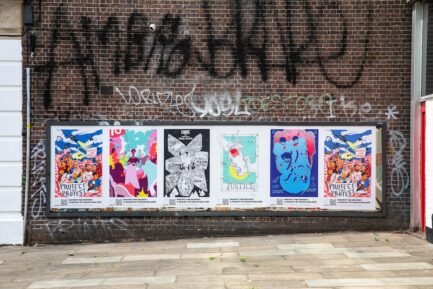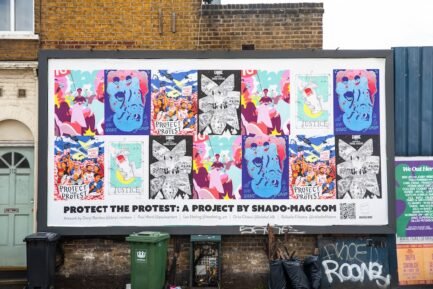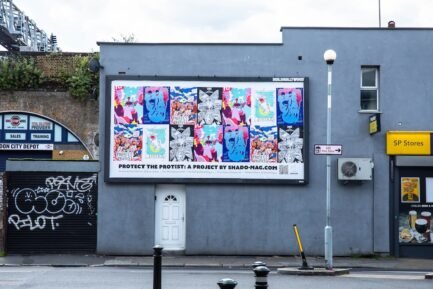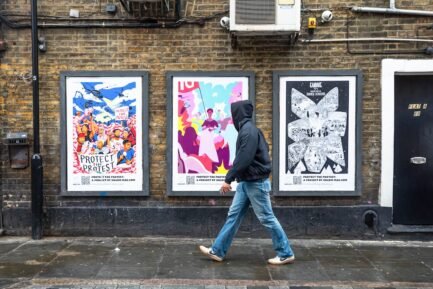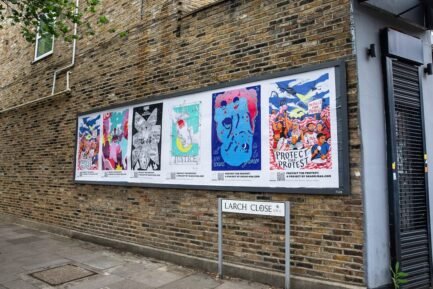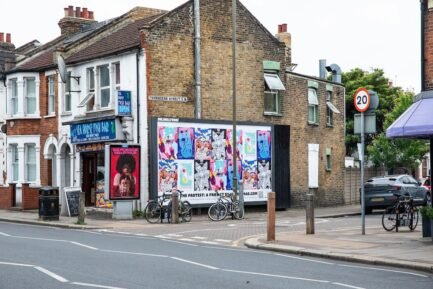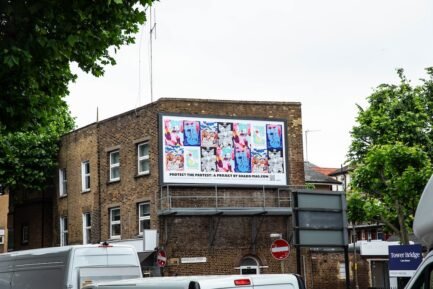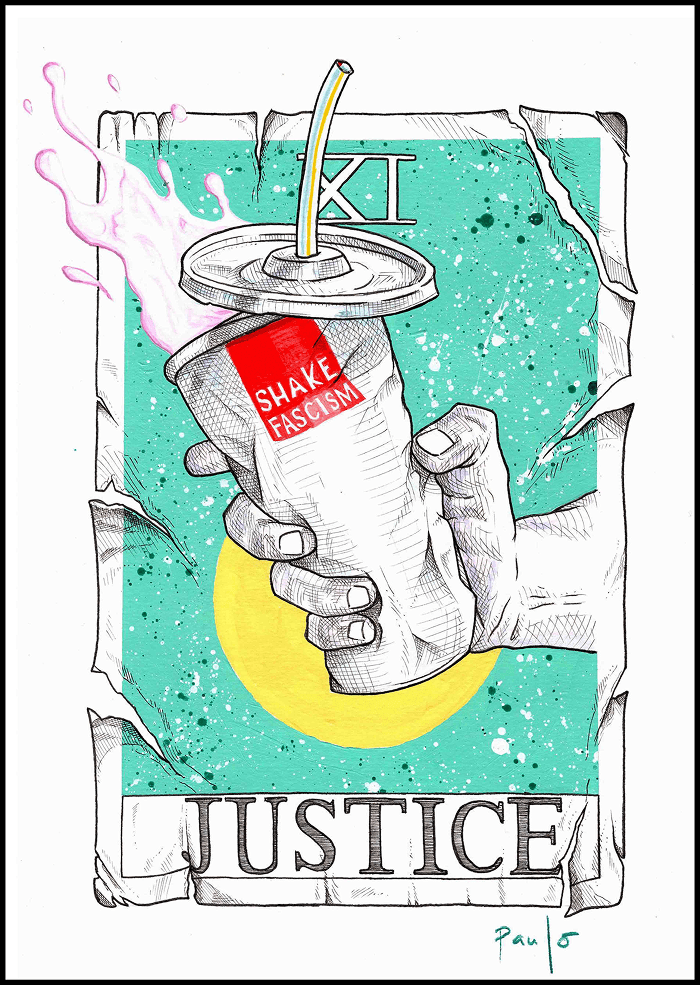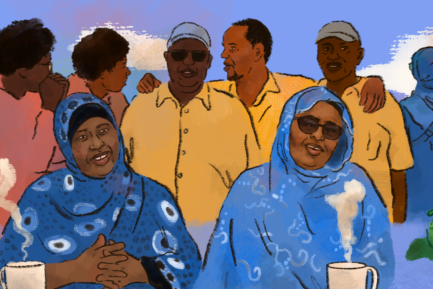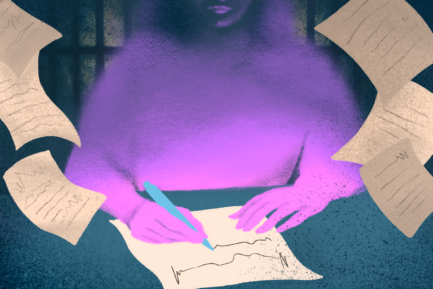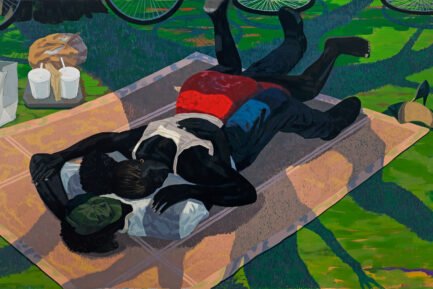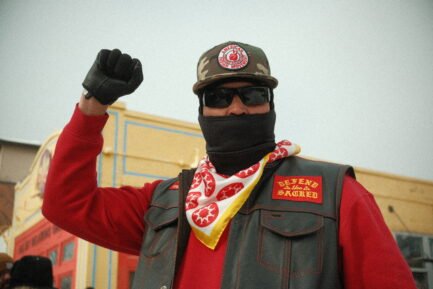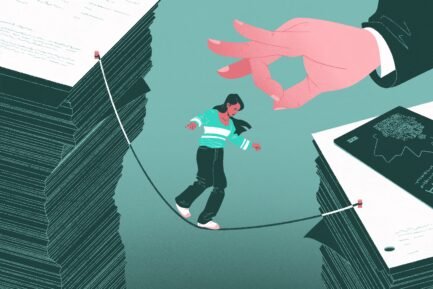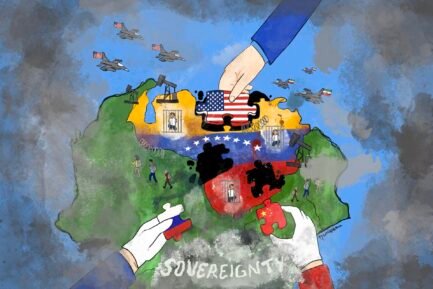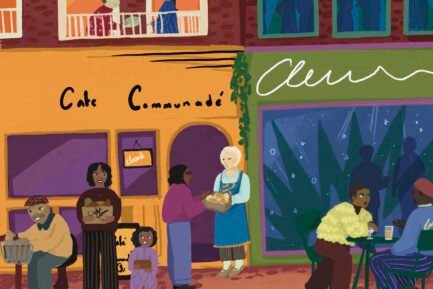Protect the Protest: Thawing the Chilling Effect
BILLBOARDS
WINNER
+ + + Own a piece of the resistance! A4 posters are available on our shop now + + +
RUNNERS UP
Lea Ebeling
I am a social anthropologist, illustrator, mural and comic artist. The artwork is part of a larger ethnograohic research project, in which I collected and drew decolonial and anti-capitalist future imaginaries with different activists in Berlin and beyond. For this artwork, I spoke with two activists from the Sudan Uprising movement who told me about their struggle but also discussed with me how they would want their country to change once the war was over. The imaginary evokes Kandake (title of ancient Nubian warrior queens) as a symbol of traditional as well as new societal and political values that are just, socialist, non-exclusionary, non-patriarchal and non-Western. In 2019, the young activist Alaa Salah spoke and sang to her fellows from the roof of a car. She was seen as the embodiment of the idea of Kandake and her image went viral. In this drawing she is surrounded by the people’s hands, as it happened in reality, exclaiming the slogan of the revolution. ‘No deal with the military, no negotiation, no compromise.’ The flower petals showing scenes of what the interviewees imagined are inspired by the principles of permaculture. They refer to ‘Living in Harmony with Land and Nature’, ‘Housing for Everybody’, ‘Commonly Owned Technologies and Resources’, ‘Education and Cultural Access for Everybody“, ‘Public Health And Joined Care Work’, ‘Pan-African Circular Economy and Finances’, ‘Politics Inspired by Tribal Values Creating Justice and Equality’, respectively.
Berlin, Germany
Driss Chaoui
During my first protest, I was surprised at how joyful people were. We walked, laughed, debated, and sang, all the while standing up to the police, who inevitably escalated the tensions every time. It was a collective manifestation of anger, joy and solidarity.
Toulouse, France
Rafaelle Fillastre
Through this image, I wanted to recenter on why we protest. The importance of it. The fact that what people are manifesting, in a way, is simple, it’s to live not the survive, to grow and to thrive not to be chained (symbolize by the thorns). It’s also wants to show the collective effort to start important conversations and to liberate from restraining norms, in short, the beauty of this effort. As such, to reframe how some medias wanted to portray protest, destructive and violent. For me, it’s building spaces, learning and group effort which fundamental for us as humans.
Paris, France
JUDGES
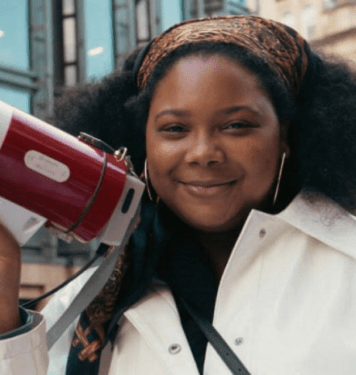
Larissa Kennedy
Larissa Kennedy is a writer, movement griot/jali (storyteller), and community organiser from South London with roots in Jamaica, Barbados, and St. Vincent & the Grenadines. Larissa has a BA in Politics, International Studies and Hispanic Studies from the University of Warwick, where her research focused on historicising climate justice in the Anglophone and Hispanophone Caribbean. During her time as an undergraduate, Larissa was formerly President of the National Union of Students, and of Students Organising for Sustainability. She also lived and organised in Buenos Aires, Argentina and Santiago, Chile. For her Master’s degree, Larissa is studying Global Affairs at Tsinghua University in Beijing. In her organising, Larissa has been part of challenging structural injustice, and building collective power at all levels - from the grassroots to the UN. Larissa is founding chair of TALAWA, a Black-led collective of racialised students and young people focused on political education and transformative action at the nexus of Black feminism, climate justice and liberated education. At shado, Larissa is a writer, editor, and co-host of the shado-lite podcast which discusses a number of the world’s biggest global injustices, supporting our community to move from apathy and overwhelm to collective action and hopeful pathways forward.
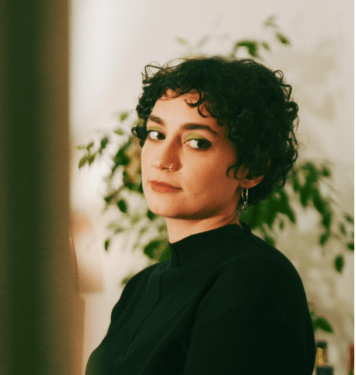
Christina Atik
Christina Atik is an illustrator and graphic designer from Lebanon, currently based in Brussels. Her work often addresses issues related to women's sexuality, societal and cultural norms, as well as immigration and exile.
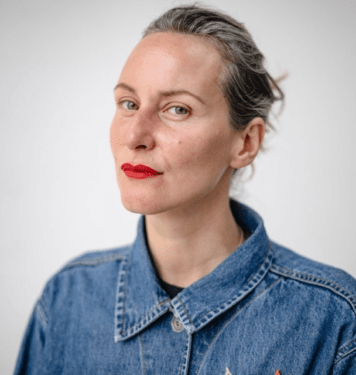
Alketa Xhafa Mripa
Alketa's work explores personal and universal themes of motherhood, women, gender relations, memory, the body, and the diverse experiences of individuals, including those affected by displacement and conflict. Utilizing a variety of media - including films, installations, paintings, and photography - she creates pieces that draw from both personal and collective experiences. Her approach is deeply personal and introspective, often inspired by the challenges faced by others, as well as those she has encountered in her own journey. As both a woman and an artist, she is committed to creating platforms and collaborations that foster new discourse and challenge oppression and injustice within different communities. Her experiences as a mother and her feminist values allow me to address a broad range of issues.

Sabrina Simons
Sabrina Simons, a board member at The Hmm with a specialization in media and journalism, brings over 20 years of experience. Currently working as a freelance content and communication strategist for various organizations, she has built an impressive career characterized by innovation and impact.
Sabrina previously served as senior lobal communication strategist at Tony’s Chocolonely and as online chief at the journalistic magazine OneWorld. She also founded the journalistic content platform for Millenials, Mindshakes, in collaboration with NRC Media and spent over six years at Vice Media as a marketing and communication professional.
Sabrina's career includes notable contributions to esteemed projects and organizations. At Lilith Magazine, she plays a pivotal role in shaping the publication’s voice and expanding its reach, championing bold, inclusive, and thought-provoking content. Her expertise extends to projects for the Rijksmuseum, where she developed two exhibitions that bridged art, history, and modern audiences, as well as impactful collaborations with Hivos, crafting content strategies that amplified social justice initiatives on a global scale.

